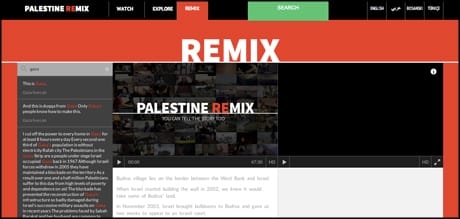Al Jazeera ‘liberating’ documentaries with new Palestine Remix
A new project from the broadcaster combines maps, timelines, quizzes and databases with 17 films that can be ‘remixed’ by users


A new project from the broadcaster combines maps, timelines, quizzes and databases with 17 films that can be ‘remixed’ by users

This article was migrated from an old version of our website in 2025. As a result, it might have some low-quality images or non-functioning links - if there's any issues you'd like to see fixed, get in touch with us at info@journalism.co.uk.
Al Jazeera launched a large, new interactive project this weekend in the form of Palestine Remix , a collection of documentaries, maps, timelines, quizzes and databases about the occupied Palestinian territories.
At the centre is the 'remix' tool, allowing users to search interactive transcripts of 17 documentaries and share the relevant clips on social media or 'remix' the films to tell a new story.
Rawan Al-Damen, the senior producer and director behind the project, told Journalism.co.uk the documentaries were chosen from 10 years of the Palestine in Focus film series and now "liberated" from "the long, one-hour format" they were originally broadcast in on television.
"[The films are now] accessible to people on YouTube and social media via these means, and this puts the power of openness into the hands of the people," she said.

Screenshot from Palestine Remix showing (l-r) the search field, the video and transcript box and the the remix video box
A search for terms like 'Gaza', 'Arafat', 'Netanyahu' or 'Shin Bet' will show every instance of where that term appeared in a film. Viewers can then share those clips or splice them together with embedded video editing tools.
A team of "eight or nine" at Al Jazeera spent nearly four months transcribing the films and using audio tool Hyperaudio to make the interactive transcripts, a tool previously used by the broadcaster in its transcripts of the 2012 US presidential debates .
Demand had risen for the Palestine in Focus films after the launch of Al Jazeera English in 2008, followed by new sites in the Balkans and Turkey, Al-Damen said, and the remix tool adds an element of gamification she hopes will engage new, younger, social audiences.
She admitted that the tool may remove the role of the journalist as a narrator however, and therefore runs the risk of users creating misleading counter-narratives, but the same may be said of selectively reproducing any news report.
"This is the risk that we are taking," she said. "If you open your content to people you should allow this to happen and [it] will happen. And we are fine with that.
"You can share the story and allow people to go to the remix and ask why they said this and then go to the original film and see things and raise questions.
"Maybe people will never go to the original film but they will talk, they will have discussions on social media and they will have it there, not on our website but on social media."
The Al Jazeera line on Palestine is unreservedly pro-Arab, and Palestine Remix highlights actions of an Israeli state given license to colonise parts of the area by the UN before repeatedly expanding its borders into Arab territory since 1948, and the suffering of Palestinians as a result.
"This is the narrative that we think is the story," she said. "We've had Israeli people interviewed here. You won't have the Zionist narrative, true, but the Al Jazeera narrative.
"We have Gideon Levy in a film called Going Against the Grain. Gideon Levy is an Israeli journalist who lives in Tel Aviv and wrtes in Haaretz. He's different, he's not the mainstream and these films would never be shown in mainstream Israeli media."
Palestine Remix will launch a mobile app in 2015, allowing further exploration of the videos and interactive, although the remix tool will remain only accessible via desktop computer.